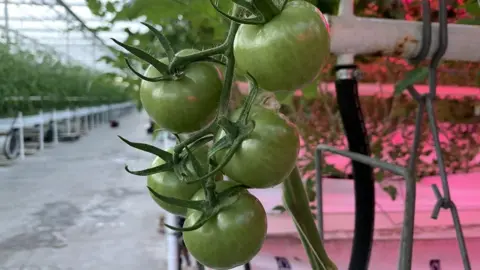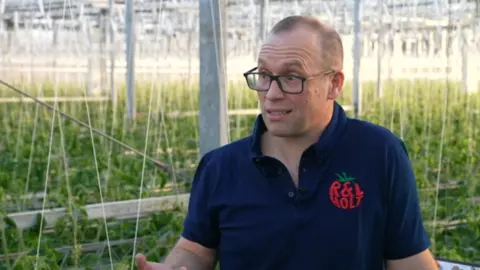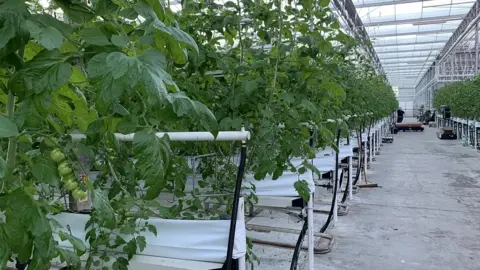Lights go off for Evesham tomato grower to save money
 BBC
BBCIt's a sign of just how crazy energy prices are that this winter one Midlands tomato grower says he will make more money sending his energy straight to the grid for us to use at home, rather than for its intended purpose of growing tomatoes.
At Sandylands Nurseries, near Evesham, Worcestershire, they generate their own power to provide the heat and light that growing tomatoes in winter needs.
But this year, when they did the sums, they realised they could make a lot more money just selling the energy and take the hit on tomato production.
Other producers are not as lucky - those that have less efficient set-ups, that depend on gas for energy will be hit hard by higher bills.
They'll be looking very hard at the numbers and deciding what size, if any, of tomato crop they'll be planting next, according to Sandylands' tomato farmer Roly Holt.
For him, the lack of light means his plants are going to take longer to produce less fruit than usual and in the end he'll produce half the usual crop.
But the energy windfall may mean he can afford to upgrade his LED lights and give himself an edge in an era of uncertain energy prices.

For now he and other growers are benefiting from the government's cap on gas prices, that has produced some certainty although at some cost to the government.
Elsewhere on the farm they use renewable energy to grow tomatoes, using equipment part-funded by green subsidies which also protects the business from high energy costs.
However, Mr Holt pointed out subsidies were withdrawn a few years ago to save money and had they stayed in place more farmers would have renewable energy powering their farms.
Instead the government is likely spending even more on the gas price cap instead.
A post-Brexit farm-subsidy scheme designed to reward landowners in England for environmental work will go forward, the government said in December.
Production cuts
It is perhaps an example of the lack of joined-up thinking about agriculture.
In the last 12 months I have spoken to poultry and pig producers who say they must cut production to survive or even get out of farming all together.
There are lots of reasons for these problems - energy costs, Brexit and the war in Ukraine as well as what farmers claim is a supermarket sector unwilling to pay a fair price for food.

And we are starting to see the impact of these issues.
The number of breeding sows in the country is at a 20-year low, the national poultry flock has shrunk and now we'll see fewer premium British tomatoes in the shops in early 2023.
The NFU has said the government is sleepwalking into a food supply crisis, while the Department for Environment, Food and Rural Affairs insisted it was committed to ensuring people have the food they need.
Supermarkets have also said previously they were "constrained" by how much costs they could pass on to customers.
But for a whole host of reasons many farmers are thinking very hard about what if anything they will produce in 2023.

Follow BBC West Midlands on Facebook, Twitter and Instagram. Send your story ideas to: [email protected]
